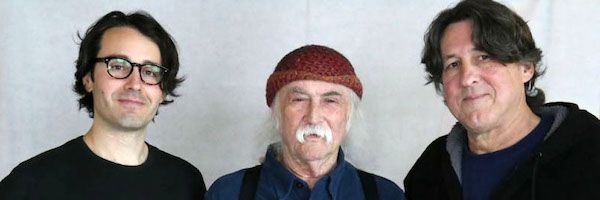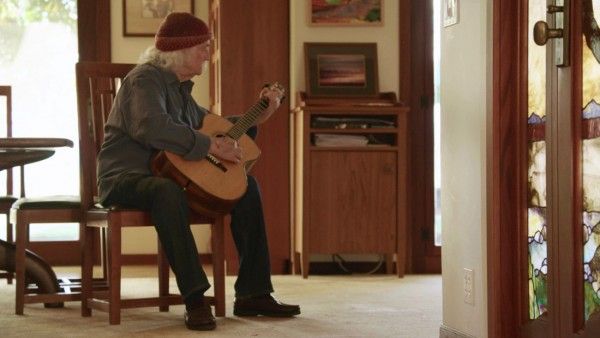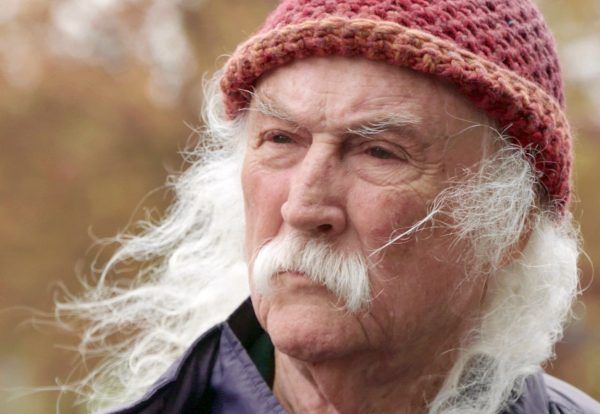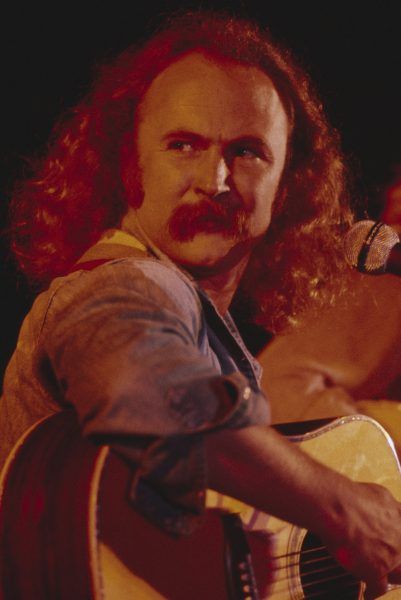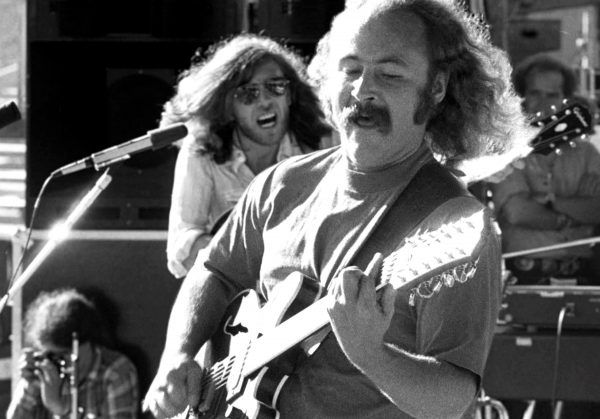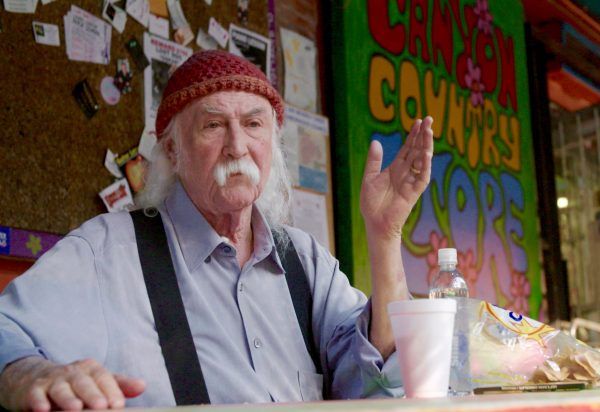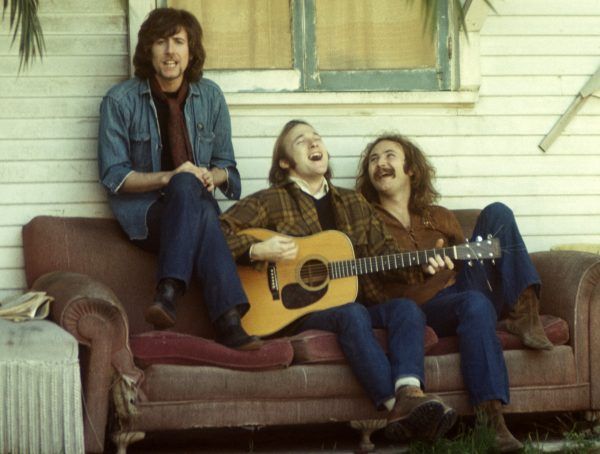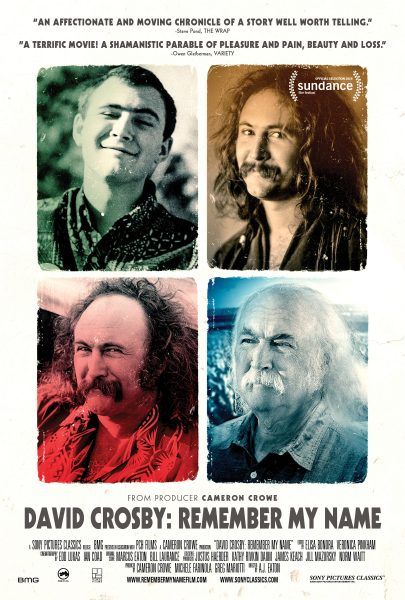From director A.J. Eaton and producer/interviewer Cameron Crowe, David Crosby: Remember My Name is not just a great music documentary about an iconic rock musician, but it’s also an intimate, honest and heartfelt portrait of a man who’s had soaring career highs and incredible personal lows, and isn’t afraid to acknowledge the role he played in it all. Through candid conversations with the singer/songwriter, the film looks at Crosby’s time in The Byrds, as well as Crosby, Stills & Nash, and Crosby, Stills, Nash & Young, and contrasts that with his experience touring today, surrounded by the young musicians who have helped inspire four albums, with his fifth currently in production.
At the film’s Los Angeles press day, Collider got the opportunity to sit down with filmmaker Cameron Crowe, who has known David Crosby since he was a teenager, to chat 1-on-1 about how he ended up getting so heavily involved with the documentary, what he wanted the film to be, how Crosby is “like a classic rock Garrison Keillor,” what first interested him in Crosby as a musician, the journey from meeting Crosby as a teenager to having him inspire Almost Famous to now having that translate into a musical stage show (debuting at The Old Globe in San Diego from September 13th through October 20th), and realizing that they had something really special when it came to this project. He also talked about the four-hour cut of Almost Famous, how much that film was shaped during the editing process, and that there are a ton of deleted scenes from that film that have never been released, but still might see the light of day.
Collider: I really loved this film! I’m a huge music fan, and I’ve been a concert photographer for many years, so this was an easy sell for me, and I just thought it was so fascinating. It’s definitely not the typical music documentary.
CAMERON CROWE: It was almost accidental that this even exists. It’s that thing that comes along, when you’re working on one thing and it’s all that you’re thinking about, and then, this other little assignment or project comes along and you’re like, “Okay, I’ll just bang this out.” And then, you go back to the other thing and it’s like, “Why can’t this be more like that thing that happened over here?” You never know where you’re gonna find some kind of revelation, and this was a little side project that became a main project. We’ve never really produced anything like this. I don’t really do that. If I put my name on something, you’ve got me. So, we delayed all of our stuff, at least six months, maybe more, to get this movie made and finished, to the way that, when I first saw A.J. and Crosby and said, “I can’t be involved with you guys, but as a fan, can it be this?,” and basically, we later came to make that movie, that was my dream version of what I knew a documentary on Crosby could be, knowing how candid he is.
If you can catch that, and also be true to his music, because he’s much more of a musical visionary than he’s given credit for, and you can bring that together, then cool. But what happened was that it started to get emotional, and it started to do that thing that you dream of in movies where, if you’re lucky, you catch something. This odd little documentary started to acquire a real heart and soul, and it became about mortality and life, and what do you do with the time you have left? I showed an early cut to my then 96-year-old mother, who once said, “No rock in the house, whatsoever,” and she said, “I believe him. That’s the most true version of heroin addiction that I’ve ever heard.” And she’s a counselor who’s heard hundreds of drug admissions. Anyway, if you’re lucky enough to make something or be a part of something, they’re all your children, in a way, but this one was the child that you don’t expect who says, “Hey, me, over here. I’m going to be important to you. Pay attention to me.”
Did you also know just how self-reflective he would be?
CROWE: Yeah. He’s an entertainer, when he tells a story. He’s like a classic rock Garrison Keillor, or something. He can build a story and tell you all of this stuff. I just love that you don’t need a lot of other people to tell you how to feel, just let him tell you. And he’s really the last standing dude of that generation, that lived through all of the versions of pop stardom, in the last 50 years, and is as sharp as ever. So, let’s listen to him.
You’ve been a fan of David Crosby for a long time. What was it about his music, originally, that drew you in, and then made you want to keep following him, for all of these years?
CROWE: That’s a good question. The first thing was that my sister brought home The Byrds’ Greatest Hits, and I was like, “Man, I want a mustache like that. Will I ever be able to grow something, anything?” And then, I started listening to his music. It’s strange, he tells you that he’s the only guy in CSN, or CSNY, that never had a hit. I was like, “Really? Is that true?” To him, Stephen Stills is the hit maker, but I just think about it as the four guys, and he’s the guy who has this formless vibe. Jackson Browne has this line where he says, “David Crosby is a genius musician crossed with Caligula.” He’s had this big lifestyle, but in the middle of it, he writes these meditation-like songs that are open-tuned, and there’s only one of David Crosby. He draws you in and takes you to a place, where it’s transcendent, if you let it wash over you. It’s what people that love The Grateful Dead tell you about the way their music makes you feel. Crosby does that to me, and I wanted the documentary to have that kind of vibe to it, too, where you could put it on and go to that place, but then, he’s also talking to you. I just like being a fan of David Crosby because he’s unpredictable and he’s difficult, but there’s no middleman. You feel that, as a fan, he’s always talking to you, and he does that in the movie.
I get that, but for me, it was always Pearl Jam. I’ve traveled around and seen Pearl Jam more than 40 times, and still, every time the lights come down and I hear that first note, I have an emotional reaction.
CROWE: Right. That does it. It’s the same thing. There’s a little rip in the fabric that they just put you in, and you get to live there. It’s so great.
It’s also why I became a concert photographer. I can’t play any instruments, so I could never join a band, but I get that same rush of energy and feedback from the crowd, when I’m at the stage to shoot a show.
CROWE: Yeah, and you’re a representative of them. I think it’s good to believe. It’s good to believe in film and in music. There’s so much that’s challenging, and so clearly untrue and dishonest right now, swirling around us. It’s just great that there’s an emotional anchor, if you choose to accept it, which is music or art that speaks truly and embraces you, the fan, with a vibe and a feel, and give you another place that you can disappear into. It’s honest.
You’re a longtime fan of David Crosby, and his music inspired Almost Famous. Now, you’re turning the movie into a stage show. It just seems like all of that keeps circling around your life, in a really interesting way.
CROWE: It’s cool that you say that. It’s interesting, I had the same feeling. [Crosby] came to visit one of the rehearsals because we were going to do an interview for the movie and it was best to just do it where we were rehearsing for Almost Famous. He came in and watched a rehearsal of one of the songs, a song called “Morocco,” that’s a really good song, and I saw it all come together. All of these young actors that were playing the parts were nervous, but then he went over and they all communed together, and I was like, “Okay, it’s all coming together. Soon, my mom’s going to walk in the door, or something.” It’s always good to always be moving forward while you’re looking back, and Crosby’s doing that. He’s moving forward and writing all of these records, but then he’s also taking the time to look back, which he hasn’t done that much. I wouldn’t be making Almost Famous: The Musical, or even this documentary, if we didn’t have a new movie that we’re going to do early next year. It just feels like a great time to celebrate music, always. Crosby is ambitious in a way that keeps you curious, at his age, but he’s also excited. You can see it in his eyes, when he says this whole movie might be a con job, and he gives you that smile. That’s not a 77-year-old dude, to me. That’s a timeless dude and a rascal. Forever, he’s a rascal.
You first interviewed David Crosby when you were 15 or 16, and you’ve been interviewing him and talking to him, over the years. Do you feel like you’ve asked him everything you would want to ask him now, or do you feel like there are still questions that you’d like to ask?
CROWE: I asked him one today that I was really happy to have finally asked him. I’m starting to get into even more stuff that I wanted to know. I’ve gotta stop, at a certain point, but it’s so fun. One of the things that I wanted to ask him is what that little smile is, at the end of the movie, which I take to be that he’s considering his entire life, in a millisecond, not for our cameras, but for himself. When I saw that, I thought, “That’s the end of the movie, but I never want to know what he’s really thinking.” And I almost asked him today, but I didn’t. I asked him who was high and who wasn’t, in the Dick Cavett clip after Woodstock. My theory was correct, that Joni was the only one that wasn’t high because she had the sharpest sense of humor in it. It’s just little things like that. It’s hypnotic, the way he tells you a story. And sometimes, he’ll just mess with your head. He’ll say stuff that’s just ridiculous and corrosive, and sometimes he’ll piss you off. When I was a little guy, and I was touring with Crosby and Nash, and I thought I was doing a really, really good job. He came up to me and said, “I remember when you used to be much more together,” and then, he walked away. I might have cried. I remember just going back to the hotel room that night and just staring at the ceiling and going, “When did I lose it? What did I do? What was it?” So, another day went by, and I finally just went up to him and said, “What did you mean, when you said I used to be much more together? I need to know.” And he said, “I say that to everybody. You’re fine!” And he walked away, laughing. I was like, “You fucker!” That’s Crosby. We try to do it to him, but he rarely falls for it. It’s a drag.
Of all the movies that you’ve made, which one would you say changed the most during the editing process, and why?
CROWE: Oh, wow, that’s a fun question. You can really draw a parallel with Almost Famous. We were coming off of Jerry Maguire, and DreamWorks was involved in a lawsuit, so there weren’t a lot of people looking over our shoulders, but we had the money to make the movie. I felt a little bit like, “Well, Spielberg read the script and said, ‘Shoot every word,’” so I was shooting a four-hour movie, that was Almost Famous. And bringing it back into the editing room, it felt unwieldy. As we started to break it down and figure out what the soul of the movie was, things started to appear, like Penny Lane dancing on the floor of the empty arena in the trash. We were like, “That’s important. This can go. Save her dancing.” It started to reveal itself. There was a really scary point, where the movie was incoherent, but we took it a little further, and it started to mesh. And then, it started to really be emotional. And then, it was done. You don’t always get that. Sometimes it gets away from you. This (Remember My Name) was like Almost Famous, in that it was unwieldy. Whenever we showed it to people, there was at least a half-hour of conversation and sometimes arguments, after we showed it, so we knew we had something, but we had to shape it and give it the humanity and emotion that the real and private Crosby has, and we finally hit that moment. I think it was when we found that smile, at the end. It was just like, “That’s it. We’re done.” And when we showed it to people, they had all of the same arguments, but there was a level of grace and understanding of the guy. It was the most fun editing experience I’ve ever had. Now, I want to edit at home, so that I have the freedom to take the big ride. With our next movie, I want to cut it that way.
It sounds like you clearly know what you’re doing next. So, what are you doing next?
CROWE: I’ll tell you the next time we talk.
Do you have a lot of deleted scenes from your movies, that people have never seen?
CROWE: Yeah, and other people’s movies. I keep their deleted scenes, too. Yeah, we tend to have stuff that’s on the bench, that can maybe come in and help us out. (Vinyl Films producer) Greg [Mariotti] keeps track of all that stuff.
GREG MARIOTTI: Yeah, we put a lot of the good Singles stuff on the last Blu-ray. Same with Jerry Maguire, on that last Blu-ray. We have a ton of Almost Famous stuff that people have never seen, that might see the light of day. As Cameron mentioned, there’s a close to four-hour cut that has a ton of stuff in it, that even surprised me when I watched some of it.
David Crosby: Remember My Name is in select theaters in New York City and Los Angeles, and opens nationwide throughout August.

